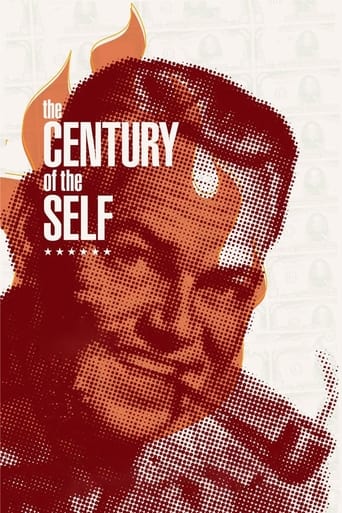

This movie is a description of the gradual shift of democracy and business to cater towards the flourishing sense of self expression and self gratification following the great war. Edward Bernays, the nephew of Sigmund Freud championed the idea that the mob, was a gathering of unconscious, irrational desires and if left to themselves would destroy themselves in chaos. He believed that you had to tell them what they wanted. Idiots he called the mob, and by combining different symbols ingrained within the subconscious desires of the individual (He linked woman's freedom rights, with the rights to smoke cigarettes, which were at that time, only socially acceptable for men). He combined these desired symbols with products to make society conform around these capitalist desires. He was the king of capitalist propaganda because of this genius to control the mob. The film then followed the rise of the hippy culture and the growing need for self expression. As Freud believed that deep in the unconscious were bad desires, waiting to come out and wreak havoc on the individual the hippy movement expressed the opposite belief that if you allowed self expression to come out, freedom would be attained and beauty would flourish. Marketers operating under Bernay's old paradigm had trouble marketing to this counter-culture and thus was born the focus group. THe focus group involved sitting a bunch of people down and allowing them to express their deepest desires about a product. Not based on logic but how it made them feel. In this way they shifted from manipulating about how you felt about a product to designing products based around the self expression of the people. But perhaps this wasn't the end of manipulating as they found that the individual wanted something to make them feel like an individual. In this spirit of self expression, everyone wanted to be unique, and capitalists seized this new self-expression. The underlying theme being that, when you want someone to choose something a certain way, you play to their emotions not their rational. Bernays still being right in this as politics learned this move in the 50's as well. They learned that they had to discover the individuals desires not their rational to cater towards. Individuals said they would like to pay tax for welfare but when it came to voting time, they acted out of their desires. In this way Bill Clinton would get footage of him doing the activities that swing voters would find themselves doing, as they must have found that people wanted a president who could relate to them. It wasn't the change in policy that had such an effect on votes, but a change in catering to the persons emotions.
... View Morethis is the best documentary i have ever seen, considering i have seen quite a lot of it. don't miss out on watching something that will change your life.I'll try not to spoil anything, but you must swear to watch this documentary. it'll change you to change the world!!!I mean, it tells you why you buy stuff, it tells you what is really going on with the government, it even has topless girls (artistic) and lesbian nuns (nice). plus all of the knowledge of yourself, its a win win situation. seriously don't hesitate, watch it now!! now!!Oh also, it explains a lot about life.
... View MoreI am going to buy this movie on DVD as soon as I can get it.It tells of the battle of good and evil not in abstract terms but in concrete facts.It tells of one group of people who see human beings as basically weak and must be controlled.Another group of people see human beings as basically good and that society must work to bring out the best in humanity.Then there is the group (the DEVIL - male and female) - the greedy, power hungry, slime balls that coop the good nature of the human being for profit and power.
... View MoreCaught this fantastic documentary at Cinema Village in NY. In short, it traces the tremendous influence of Freudian ideas and the family Freud - Siggie, Anna, and nephew Edward Bernays - on the development contemporary capitalist societies.Using chilling footage and lucid voice over, it traces the methods by which Freud's discoveries about the sub/unconscious mind were systematically implemented by corporate America in the 1920's and later the U.S. government to increase their wealth/power while at the same time giving people the impression of greater personal freedom. It was Bernays who founded the 1st public relations firm and coined the term "engineering consent".Its thesis spans everything from the invention of public relations, modern advertising techniques, Nazi Germany, CIA brainwashing, the self-help movement, consumer culture and current U.S./British electoral politics. All of which have direct antecedents in the ideas of Freud.Apparently, due to lack of copyright clearances, it is not available on DVD or tape. But hopefully it will make the art house circuit. His follow-up, The Power of Nightmares, is supposedly even better. It deals with 9-11.More comprehensive and persuasive than "The Corporation" and more objective and grounded that Michael Moore's work, "Century of the Self" is essential viewing. If you think corporate and government collusion in controlling the masses is tin hat stuff, well, start measuring your head...
... View More